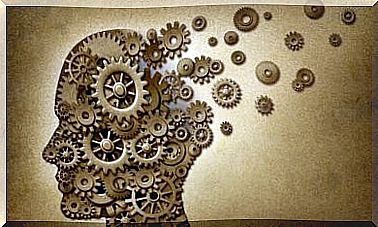Anger In The Grieving Process

Anger in the grieving process is a common stage. However, there are those who are stuck in this phase, who collapse emotionally and are trapped in anger at the loss they have experienced. It is not easy to handle all that convulsed ball of feelings, there where anger and misunderstanding by what happened changes our character and plunges us into a very debilitating state.
William Shakespeare used to say that crying makes the mourning less profound, but when someone cannot give way to emotional relief, they become a stone that falls under its own weight into the depths of that pit of grief. Thus, of all the stages of mourning defined by Elisabeth Kübler-Ross, it is quite possible that the second one, characterized by anger and frustration, is the most problematic.
This phase defines the moment when a person becomes fully aware of the death of that loved one, but instead of accepting it, they rebel. The mind begins to look for guilty, feelings of injustice, resentment, anger, are embedded steadily and deeply.
The emotions become almost that furious wind that constantly shakes the clothes hanging on a rope, shaking it, deforming it, wanting to tear it away from the rope where it is attached. The person wants to be in control, but feels incapable. Because anger is fury and often, it transforms us into something that we are not.

How does anger in the grieving process manifest itself?
Anger in the grieving process arises as a reaction to loss. We cannot forget that this emotion, like anger, is an instinctive mechanism that has helped the human being to react to what the brain interprets as a threat. Therefore, what is more shocking than losing someone significant? The imprint of pain is tremendous and as such an answer appears.
Experiencing these kinds of realities is completely normal. What’s more, studies like the one carried out by the doctor
Now, there are yes, complicated duels, such as the frozen or delayed duel, where for years to drag that unresolved loss that in many cases, leads to depression. Let’s see, however, how anger manifests itself in the grieving process.
Obsession with what happened and unanswered questions
When we lose someone it is common to ask ourselves many questions. A very common one is one where, as a lament charged with rage, we wonder why that person and not another. Why did this have to happen to my father if he was still so young? If he was so good and he wanted so much to live, why did he have to leave?
These types of ideas become fixed and obsessive points in the mind of that person who is caught up in their grieving process. The obsession with what happened, with looking for explanations and even guilty is something common that fuels anger itself.
Hypersensitivity
Anger in the grieving process causes the person to suffer hypersensitivity in many cases. Suddenly, any unexpected stimulus, any sudden news or event affects them intensely. They oversize everything negatively, anything affects them in an uncontrolled and even devastating way.
Personality and character change
One thing we must understand about anger and rage is that they have transformative power. They change us, they make us someone we are not and we do not like. Motivation is lost, what we were previously passionate about ceases to interest us, patience and interest disappear, we stop connecting with people. Likewise, empathy is reduced because suffering forces us to focus solely on ourselves.

Apathy, physical pain, mild depression
Anger in the grieving process also translates into psychosomatic illnesses. Thus, stomach pain, physical and mental fatigue, headaches, insomnia or a greater tendency to suffer infections is something recurrent in these situations. On the other hand, it is common to show indicators of depression that, if not treated, can worsen over the months.
How anger is treated in the grieving process
One of the greatest dangers of experiencing anger in these situations is that it can sometimes lead us to behaviors that are as dangerous as they are harmful to our own health. There are those who resort to drinking, gambling or any behavior that allows them to ‘forget’ the pain of loss. Without a doubt, they are very complicated situations.
Therefore, when dealing with these types of realities, we must be clear that psychological therapy is not only recommended, it is in fact the only way to regain control of our life and allow us to move forward again. Thus, the strategies that are usually followed are the following
Keys to work on
- Prior assessment of the person’s health status. Before starting therapy, it is recommended that the patient undergo a medical examination to find out their health status and the presence or absence of other pathologies.
- It also requires a firm commitment on the part of the person that they are going to follow psychological therapy.
- When working on anger, it is advisable to make use of cognitive restructuring by identifying limiting and irrational thoughts. It will also facilitate emotional channeling, relief and resources to alleviate that deep emotional discomfort.

It should be noted that this type of therapy varies greatly depending on the needs of each person. It is also a process that requires time and a firm alliance between the person and the psychologist. However, the success rate is high, we can therefore overcome this type of situation. Also, books like Let them go with love. The Acceptance of Grief, by Nancy O’Connor, can help us.









